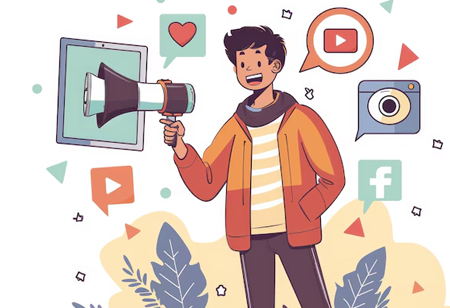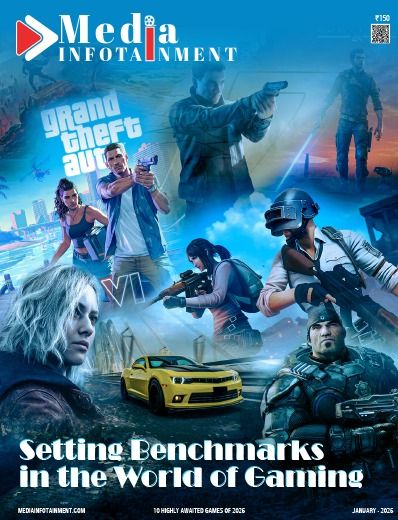MC Explains: India's Broadcast Bill's Impact on Influencers
Under the unreleased draft of the Broadcasting Services (Regulation) Bill, 2024, Social media influencers like Dhruv, Rathee, and Abhi and Niyu, who hold numerous political viewpoints, could be classified as digital news broadcasters, thereby subjecting them to government regulations.
Money control has surveyed a copy of the bill, meaningful provisions that have escalated worries about possible censorship and violations of freedom of speech and expression.
The government has discussed with a limited number of stakeholders but has yet to make the draft public. This approach has faced criticism from various groups, who are calling for the draft to be released for the public.
The designation of news influencers as digital news broadcasters is among the numerous provisions in the unreleased draft, which is expected to instantly affect the creator ecosystem projected to exceed $3.9 billion in total revenue by 2030.
What are the conditions for being designated as a digital news broadcaster under the draft bill?
The unpublished draft defines a 'digital news broadcaster' as any organization that distributes news and current affairs programs via an online newspaper, news portal, website, social media platform, or other medium. This can be a component of any company, professional, or commercial endeavor. The measure discusses but does not define a minimum number of subscribers or viewers required to fall under the scope of the rule.
What about artists and influencers who do not cover news?
The draft law will also include a travel or food influencer whose subscriber or viewer count is "above a certain threshold" in the scope of control under this legislation.
They are classified as over-the-top or "OTT broadcasting services" in the draft. This is described in the bill as a broadcasting service in which programs "other than news and current affairs" are made accessible to consumers on-demand or live via a website, social media platform, or other online medium.
Will news and non-news influencers be required to alert the government about their activities?
Yes. According to the draft bill, OTT broadcasting service operators and digital news broadcasters must supply the Union government with information about their activities within one month of the proposed legislation's announcement.
Will developers be compelled to create a grievance redressal system?
Yes. The draft law states that every broadcaster must "appoint a grievance redressal officer" to receive and hear complaints that violate the information and broadcasting (I&B) ministry's Program and Advertisement Code.
What are the conditions for being designated as a digital news broadcaster under the draft bill?
The unpublished draft defines a 'digital news broadcaster' as any organization that distributes news and current affairs programs via an online newspaper, news portal, website, social media platform, or other medium. This can be a component of any company, professional, or commercial endeavor. The measure discusses but does not define a minimum number of subscribers or viewers required to fall under the scope of the rule.
Will members of a self-regulatory organization be required for creators?
Indeed. According to the proposed bill, broadcasters, operators, and networks must form a self-regulatory agency within ninety days of the law's enactment. This body will need to include news and other influences (above a particular threshold).
Before posting, would YouTubers and Instagrammers who are influencers have to self-certify their content?
Once again, indeed. According to the proposed bill, before a creator may publish their work, they must form "one or more Content Evaluation Committees" with a variety of persons who will vouch for their work.
What actions will the creators' self-regulatory body take?
Complaints that have not been resolved within the allotted time frame by broadcast network operators or authors will be handled by this committee. In order to ensure that the Program Code and Advertising Code are followed, it will also provide its members with instructions or recommendations.
When will artists be able to appear before the powerful Broadcast Advisory Council that the text envisions?
The proposed draft bill suggests creating the Broadcast Advisory Council, whose members would include representatives from the ministries of women and child development, external affairs, social justice and empowerment, and I&B, among others.
In cases when complainants are dissatisfied with a self-regulatory body's ruling, this council will consider complaints alleging violations of the Act once it comes into effect as well as the Advertisement and Program Code.
This implies that the creator's grievance redressal officer is the first person to be contacted if someone has a complaint regarding the creator's material. The user has the option to appeal to the self-regulatory organization for creators/influencers if they are dissatisfied with the judgment made by the redressal officer. The user may also appeal to the Broadcast Advisory Council if they are dissatisfied with the self-regulatory body's ruling.
Is it possible for the government to request data about content providers from social media platforms?
Indeed. According to the proposed bill, social media platforms would have to give the government information, including that on OTT broadcasters and digital news broadcasters, if requested. In order to guarantee that OTT broadcasters and digital news broadcasters are in accordance with the Act, the government may also issue directives to social media sites.
Social media companies that disregard these instructions risk legal repercussions under all applicable laws, including the new Bharatiya Nyaya Sanhita, 2023.
What are the consequences for artists who break rules?
The government has the authority to issue advises, warnings, censure, or financial penalties to anybody who violates the law.
If influencers are found to be in violation of the Program and Advertisement Code, what are the consequences?
If it is determined that a broadcaster—which encompasses any creator—has violated the commercial and program codes, they may be obliged to remove or alter the offending program or advertisement and abide by any cautionary or warning statements. Such creators may also be subject to penalties from the government.
Can the government provide creators exemptions?
If "genuine hardships" are not encountered, the government may decide to loosen these regulations for digital news and over-the-top broadcasters. Only those "who constitute any distinct class or group" will be covered by this.
🍪 Do you like Cookies?
We use cookies to ensure you get the best experience on our website. Read more...






